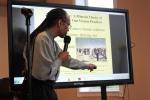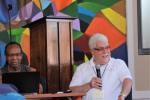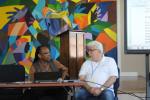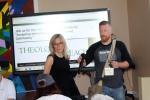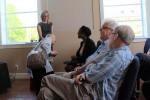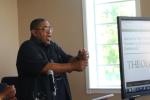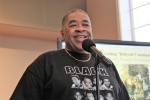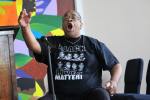 Jonathan Brenneman, the Coordinator for Israel/Palestine Partners in Peacemaking, Mennonite Church USA, The Spiritual Practice of Nonviolent Direct Action:
Jonathan Brenneman, the Coordinator for Israel/Palestine Partners in Peacemaking, Mennonite Church USA, The Spiritual Practice of Nonviolent Direct Action:
Best practices for active bystanders able to disrupt the status quo:
- Feel the discomfort.
- Assess what’s happening.
- Be aware of how many people are around.
- Be aware of exits.
- How can the person who is being attacked leave?
- Beware of tunnel vision.
- You don’t want things to escalate.
- Understand your goal. You’re not out to win the argument but to resolve the issue.
- Don’t engage the aggressor, engage the victim or target.
- Use humor, empathy, and distraction.
- Make people aware of different choices.
- Make yourself lower than the aggressor.
- Use natural facial expressions.
- Show that you’re not trying to take control of the situation.
- Videotape the situation.
- Ask for help.
- It’s counter intuitive to enter the situation with an attitude of submission, but that’s what works.
- The goal is connection and repair, not to destroy the other.
- The situation isn’t over when it’s over. Afterwards it’s time to debrief.
To de-escalate for the target of aggression:
- Don’t act frightened or frightening.
- Must speak respectfully.
- Remain calm. Breath.
- Silence disarms.
- Watch body language.
- Use humor and distractions.
- Introduce yourself, shake hands.
To de-escalate:
- Ask what time it is.
- Empathize.
- Remember that the aggressor is loved by God and wants to act positively.
(Notes from Jonathan’s presentation at the the 2017 Theology & Peace Conference: “Embracing We-Centricity: Practices that Nurture the Common Good”)
For more information on Christian Peacemaker Teams/Palestine: https://www.cpt.org/work/palestine




